The era of the gold rush is history, but the thought of untold wealth still excites the minds of people today. Is it possible to become a real prospector these days? How do you find gold in a river where search for, what equipment will be needed? Let's find out.
River gold as a secondary deposit. The concept of "alluvial deposits" and their types
Continuous physical and chemical influences cause the primary rocks containing the precious metal to deteriorate. Constant temperature fluctuations, precipitation, and underground currents all contribute to the inevitable changes. Gold, once separated from the rock, begins its journey down the mountains, forming secondary or placer deposits.
River gold is one of those deposits. This precious metal is very heavy, so it accumulates where water washes out the lighter elements.
River gold refers to alluvial deposits, which are divided into three groups:
- terraced;
- bottoms;
- oblique.
Alluvial placers are usually ribbon-shaped, longitudinal in relation to the direction of the valley.
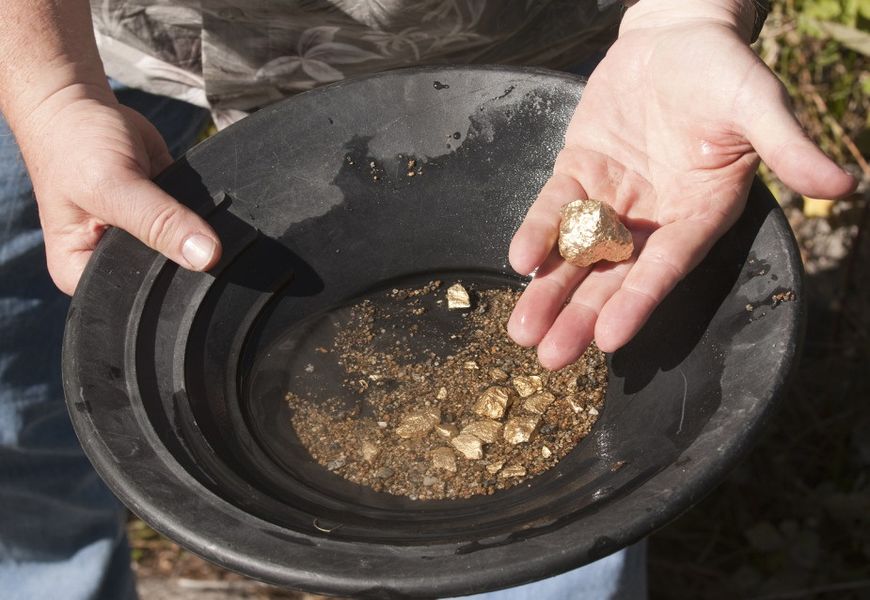
Terrace placers are characteristic of mountainous terrain and arise due to periodic incision of rivers. They are found both in full-flowing streams and in dried up arteries. "Terrace" refers to a bottom-island that rises above the level of the shore.
Bottom placers are precious metal that has seeped through layers of rock to a bedrock bed.
The spits should be searched for on the river spit.
How do I know if there is gold in a river or stream? Let's consider this question in more detail.
Which rivers and streams can be gold-bearing
Precious can be any water streams of Russia, flowing from the uplands downwards. Especially rich in precious metal are the rivers of such places as the Transbaikal Territory, Siberia, and the Urals. Particular attention should be paid to shallow streams.
The goldfish move only if the water flow is fast enough. The metal should be sought out where the river flows are slowing down, as there is a chance that the gold sand has sunk down.
Exploration, preparation and secrets of the search for gold: the main stages
The search for prospectors is never without preparation and a further smile of fortune. There are certain precepts, following which the chances of finding precious metal are increasing markedly.
Find a map of geologists and walk to places where mining has already taken place
Where excavation has already stopped, there may be precious metal left behind. This is due to the fact that not all professional equipment is able to extract it completely from the ground. Therefore, an attempt to try your luck in such places often leads to a positive result.
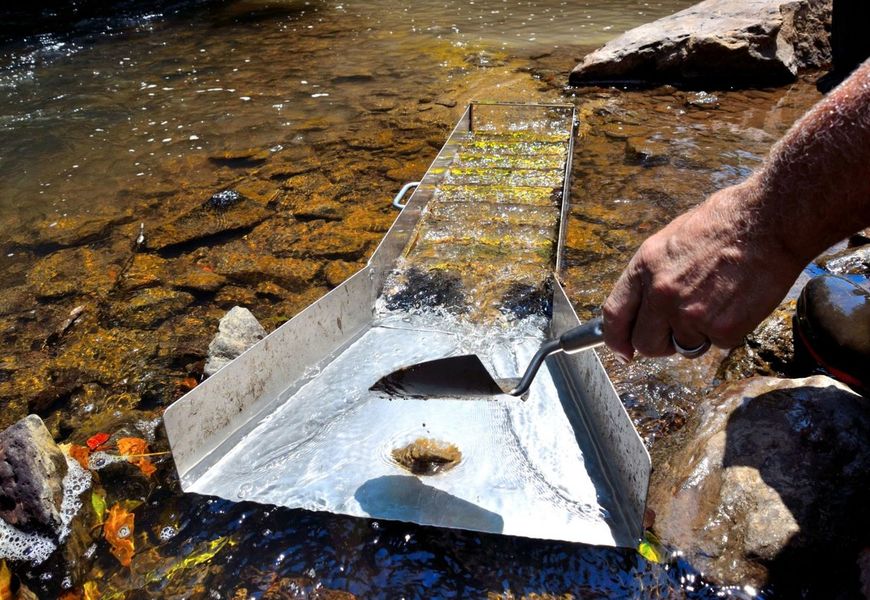
Study the terrain and landscape
This point is key. Studying mineralogical maps before searching will make the task much easier.
Detour of the river valley with equipment
An ordinary metal detector will not "see" gold under water. It zones the soil at a depth of 10 cm to 1 meter, depending on the power.
Unrefined metal contains a large amount of impurities, which complicates the operation of the device. Gold prospectors are better to look for places where the precious metal is located as close to the surface as possible. Shallow mountain rivers are ideal for searching.
Also, keep in mind that the metal detector reacts equally to gold and iron.
Studying the bottom and bed of the river, its currents and underwater rocks
The gold prospector should determine the stem of the river during floods. This will immediately exclude places where there is no gold, because the water flow has carried it to another place.
Usually the precious metal lies at the very bottom of the river. If opening the top layer reveals clay, then this layer should be checked for metal. The clay may turn out to be false bedrock.
The rate of flow will slow significantly where the tributary flows into another river or lake. It follows that the place of potential gold particle deposition will be the beginning of the mouth.
The search should definitely be carried out also where the river tends from the mountain to the plain. The best area is the area where the turbulent stream flows into the river.
In the river you need to look at the massive boulders. As a rule, gold can accumulate in front of them.
If a stream rod passes through a large stone, the amount of deposited gold in that location increases many times over.
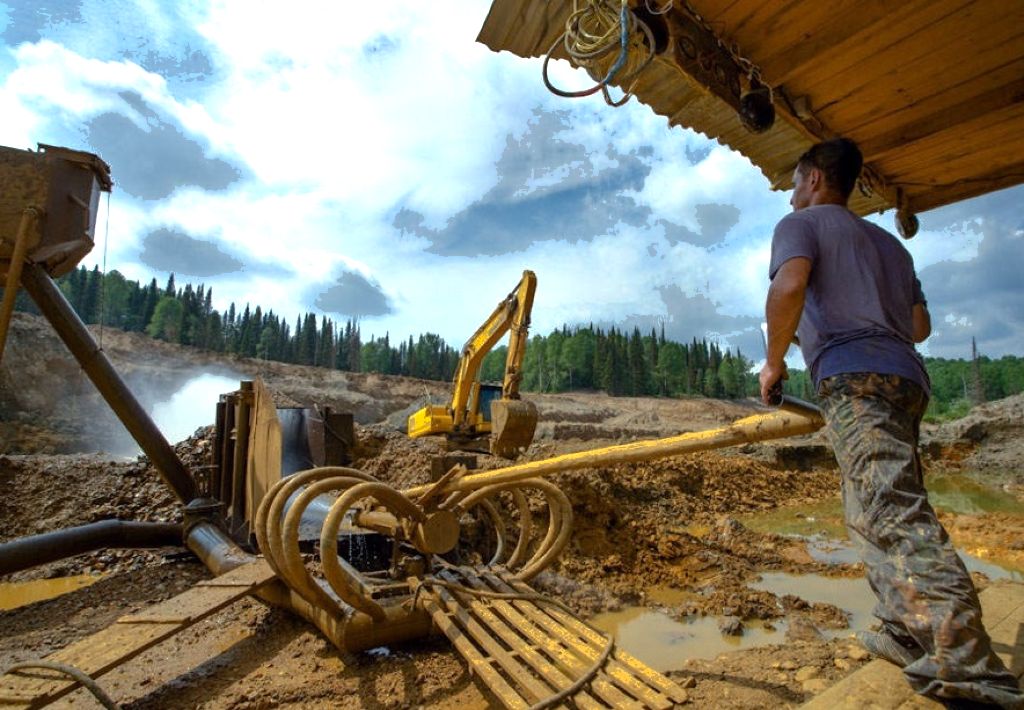
Surveys of rocks, depressions and crevices nearby
Hollows and crevices may contain precious metal and should also be checked. However, if you encounter residual deposits, it is not certain that you will be able to retrieve of them gold.
Find a group of like-minded people
Greed is not the best companion gold digger. Like-minded people will help speed up the search process considerably. Sharing experiences and delegating tasks will yield greater results than working alone.
Teamwork is also due to personal safety. Partners will always be able to back each other up in case of emergencies.
Make a detailed plan with the distribution of functions
Any large task is easier to solve if it is broken down into several smaller ones. Creating a clear plan, distributing search areas and tasks among the members of the gold prospecting team is an important moment of all the process.
Exploring the shore with a metal detector for the presence of rock - a companion to gold
Within the rocks, quartz, pyrite, platinum, lead, adular, and galena are predominantly adjacent to the solar metal, silver.
The latter metal is often found with gold in the same nuggets.
The listed rocks can be detected with a metal detector. They are a real "cheat sheet" for the treasure hunter; their presence is a secondary sign of the presence of gold. However, companion rocks are never an absolute guarantee of the presence of the precious metal nearby.
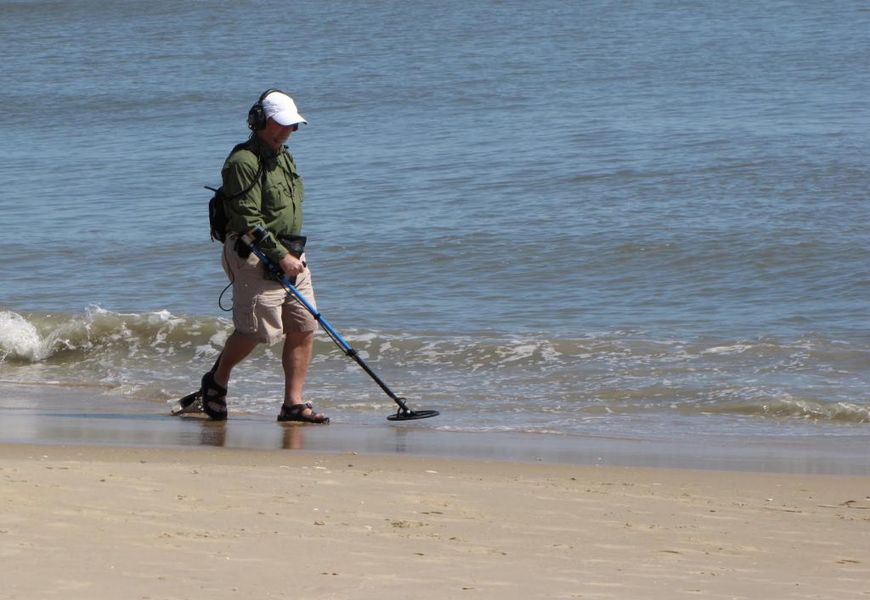
Why the metal detector cannot detect nuggets at depth
Metal detectors have a certain power. Even the most expensive device will not be able to zone the ground to a distance of more than one meter.
When working with the device, it is recommended to keep the coil as close to the ground as possible. When a signal is received - the location is audible in all directions. The pulse is imaginary if the device's beeping stops immediately.
Important: Gold is not a tandem with silver. Platinum is often found in tandem with gold.
If a prospector discovers silver separately from gold, then there is no solar metal in the area. Silver does not border on this jewel, it can only be contained together with it in nuggets.
Platinum can be found among precious metal placers. Such a find is always a great fortune for the miner, as this metal has a higher value.
Since antiquity, platinum nuggets have been found along with gold. For a long time they were considered a harmful impurity by the people of Spain, and it was the Spaniards who nicknamed the metal platinum, which means "silver" in derogatory terms.
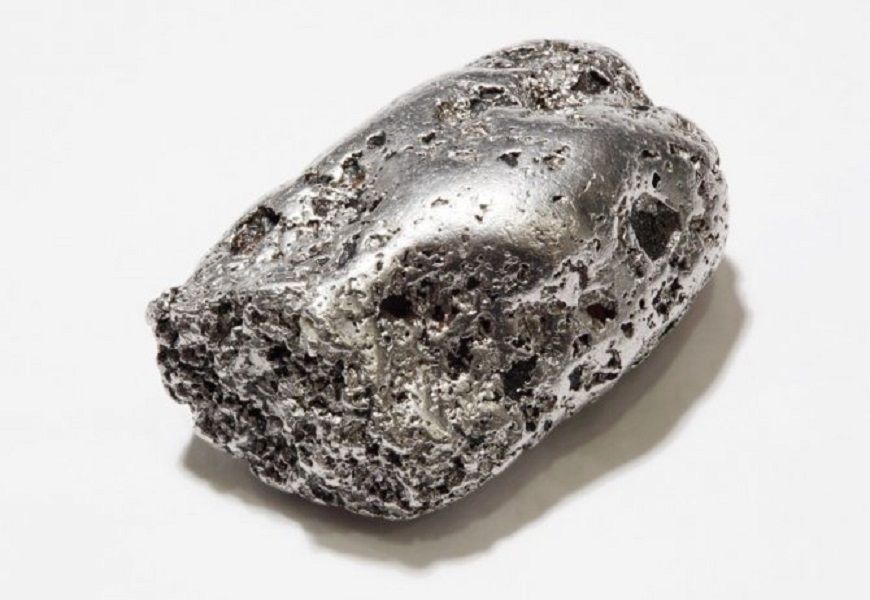
How you can come across fake gold - pyrite
It is not uncommon for first-time gold prospectors to confuse the precious metal with pyrite, which has even been dubbed "fool's gold. Pyrite glitters and sparkles in the sun, while natural gold never has a mirror-like luster.
The surest way to distinguish precious metal from "fool's gold" is to scratch it with a thin needle. Pyrite, like mica, crumbles from such exposure.
Prospectors often carry a magnifying glass with them to look closely at the questionable metal. The crystalline structure is characteristic of pyrite, but not of gold.
Purchase and prepare the necessary equipment
Without the proper equipment, the search may not yield any results. A novice prospector will need the following equipment:
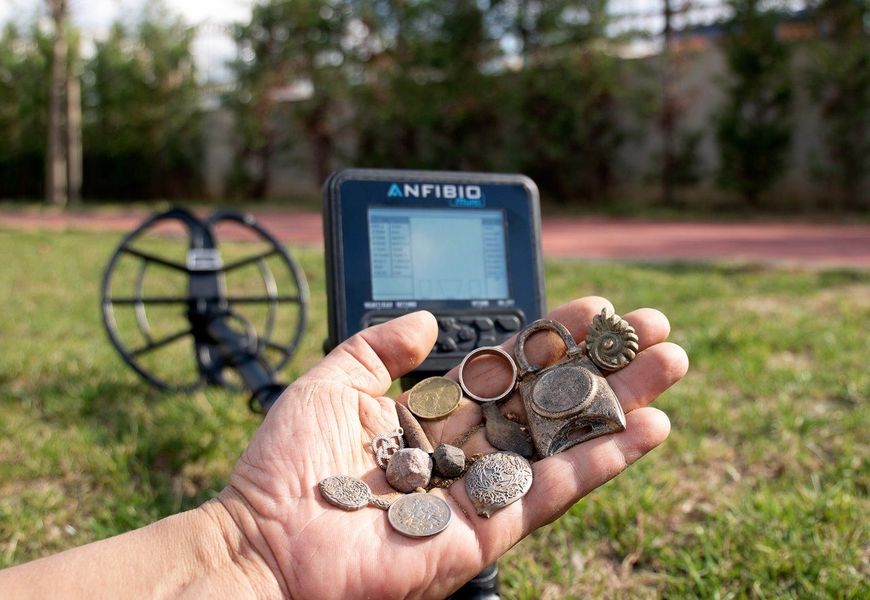
- high-sensitivity metal detectors;
- flushing trays or sluices;
- minidrags;
- special devices.
A metal detector is a rather expensive electronic mechanism that detects metal targets in a neutral or weakly conductive environment. The difference between models of different price category is in the method of emission and capturing of special waves. Expensive device is able to determine the type of detected object, depth of occurrence, have many additional functions.
When choosing a manual wash tray, it is worth bearing in mind that its shape and material can affect the effectiveness of precious metal mining. Modern gold prospectors prefer plastic trays.
A minidrag is a simple device adapted for metal extraction in water. The principle of operation of the minidrag is similar to a vacuum cleaner: it sucks up and filters the particles of the elements. The disadvantage of the device is its weight - about 10 kilograms.
Specialized electronic devices determine the classes of companion rocks, this greatly facilitates the search for the precious metal. Such devices are expensive, but novice treasure hunters can easily do without them.
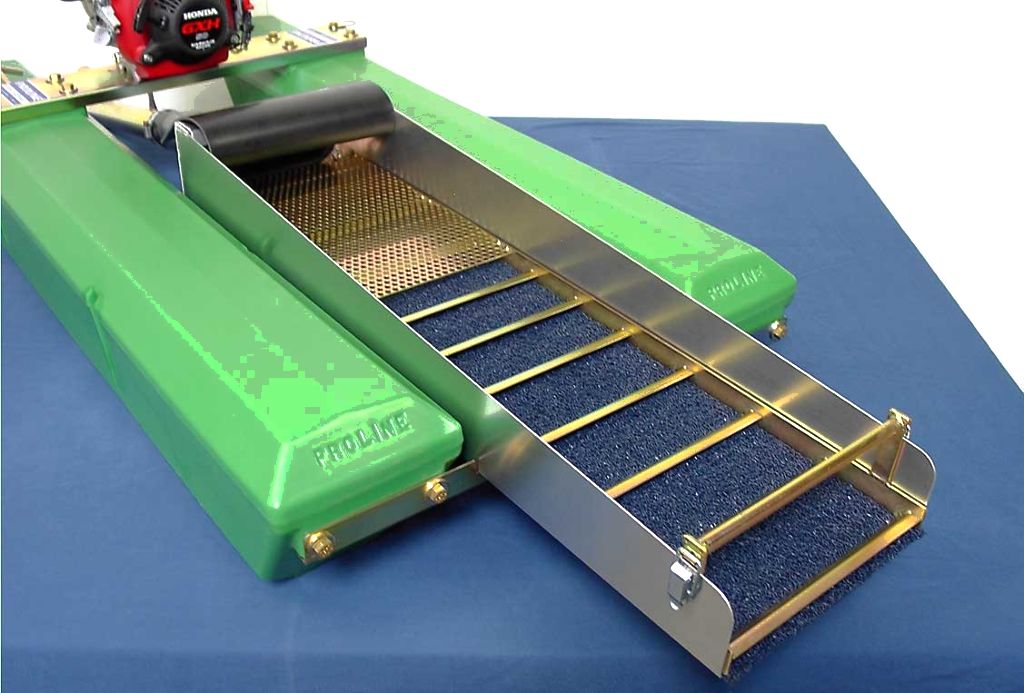
Places recommended by experienced miners
Experienced gold prospectors highlight some places that should definitely be visited as a beginner, as well as a seasoned prospector. These include:
Shallow streams and settling of nuggets on "rafts"
When exploring areas of rivers and reservoirs, you need to focus on small streams. It is often in these streams that the largest accumulations of gold are found.
Under the pebble layer are bedrock deposits, which are referred to as "rafts. The precious metal seeps through the compacted rock over time, settling in the bedrock. Gold finds found on such rafts can boast biggest size.
Waterfalls as filters for golden sand
Pits and small whirlpools form under the waterfalls. The water changes position from vertical to horizontal, which causes the gold to be pressed to the bottom.
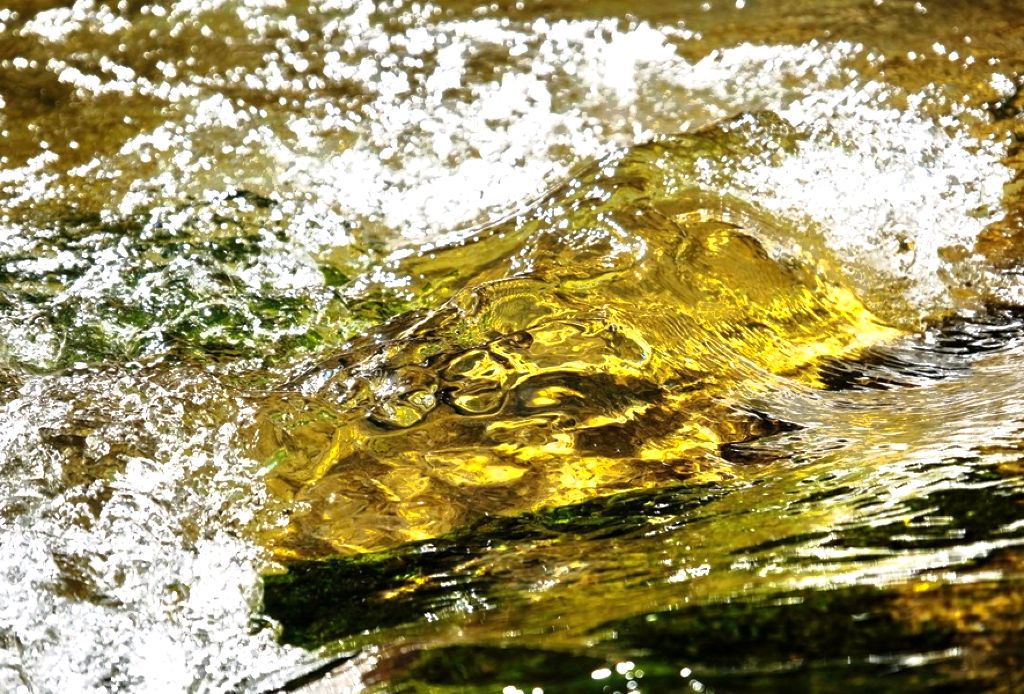
Licensing of prospecting activities from a gold mining company
On the territory of Russia It is legally possible to mine gold only with a contract with a licensed enterprise or under a personal license, but then the prospector must be registered as an individual entrepreneur. In the second case, a person will be able to pan for precious metal on a small free plot for five years.
What will happen for illegal mining. What the law says
It is forbidden on the territory of our country to gold mining individuals. There is administrative responsibility for violation, a fine from 3 to 5 thousand rubles and confiscation of the precious metal. Criminal liability arises only if especially large-scale illegal mining is proven.
Top 10 Russian "gold-bearing" rivers
Experienced prospectors identify ten rivers, where it is definitely worth looking for precious metal:
- Lena River basin. By the end of the 19th century, some 30,000 workers were working there. Today the basin is still of interest to miners.
- Bohm River. Gold in the river is found along its entire length.
- Millionny brook. Rich placers of precious metal are found every year.
- The Unaha River. Water streams connect to the Unaha from the Uldegid and Olongro tributaries, where placer deposits are located.
- Jalon Creek. Most of the metal is already mined out, but artisanal miners regularly find gold here.
- Bodaibo River. Distinguished by a coarse, reclaimed solar metal.
- Bolshoi Chanchik River. Large nuggets are found here.
- Alekseevsky brook. In the waters of the creek there were gold finds weighing up to one kilogram.
- Talga River. Active gold mining has been going on since the 19th century.
- Sanarka River. Gold used to be mined in this area on an industrial scale.
It is also worth paying attention to many areas of the Crimea, Bashkiria, Sochi, and Krasnodar Territory. The precious metal is found in such rivers as Belaya, Urup, Don, Oka, Kuban, Yaya, Sochinka, Tsna, Ai.
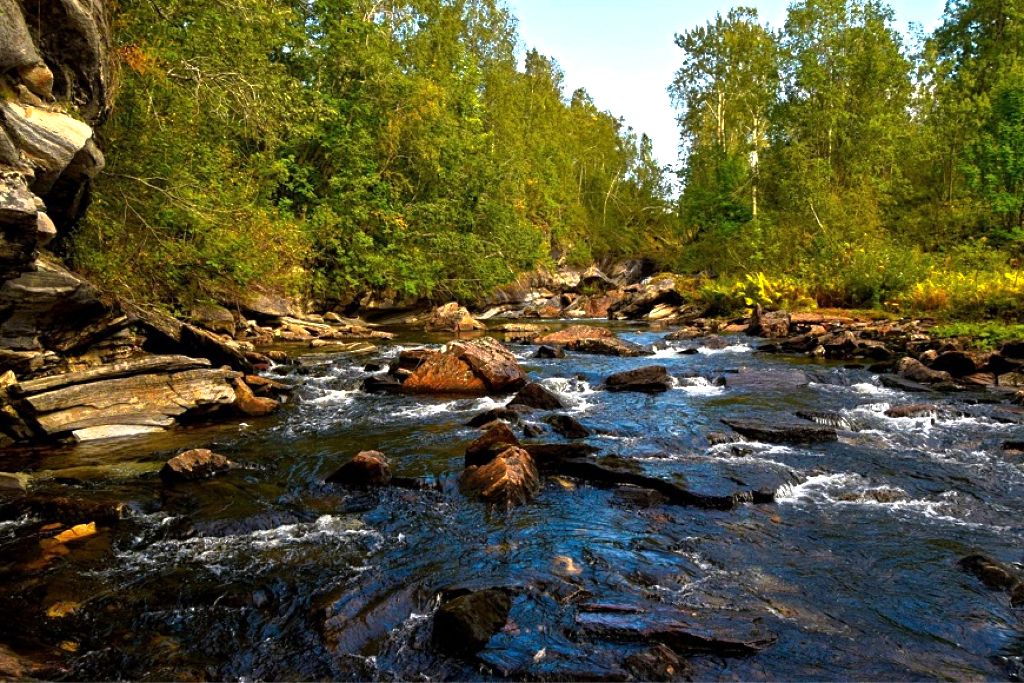
Three main ways to extract gold from a river
The following methods metal mining are the most common:
Minidraga - washing gold by hand
The dredge, like a large vacuum cleaner, draws in rock from the bottom and subjects it to filtration. Minidrags used by private miners are much smaller in size, but have a similar principle of operation. The main difference is that the process is controlled manually.
The productivity of these devices is high, they can process about 100 kg of rock in 60 minutes.
Gravity differentiation and rock crushing
Shredding gold-containing rock is called gravity differentiation. The method is used in the development of primary deposits on an industrial scale. Private gold prospectors do not resort to differentiation.
Searches with a metal detector. Table: The most effective metal detectors to search for gold in the river and ground at depth
A beginner in handling a metal detector should first study the manufacturer's literature, get acquainted with all the parameters and characteristics of the model of interest. This will significantly increase the efficiency of the work.
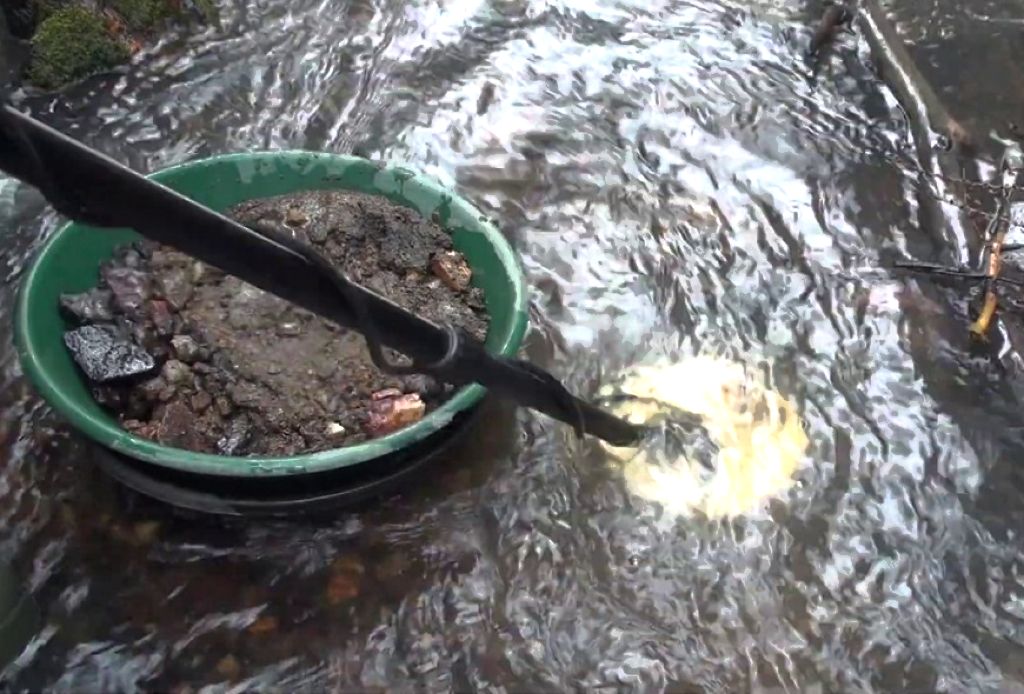
For the first experience of using the metal detector, a familiar area close to home will do.
Metal detectors for searching for gold can be universal and specialized. The table below shows the best devices in terms of value for money and quality.
| Title | Features | Cost |
|---|---|---|
| Teknetics Eurotek PRO with coil 11 | It has all the features usually found in devices of a higher class. It has an adjustable discriminator that allows you to cut off unnecessary metal targets. The interface is intuitive. | 22,350 rubles. |
| MINELAB X-TERRA 705 | The mechanism belongs to the professional, has several frequencies, error-free mode of discrimination. | 37,000 rubles. |
| Fisher F75 | A popular choice of professionals. It has a relatively light weight, high recoil rate, increased sensitivity to all targets, and an intuitive interface. | 57,000 rubles. |
These devices are capable of making gold search with a metal detector in the streams is profitable, fast, extremely exciting.
Video: mined gold in the river minidragoi
Subject: Q&A
Is it possible to find a nugget in a stream?
If I happen to find a piece of gold in the river, does it belong to me? There is no license
The best solution may be to go to the police, where a special protocol will be drawn up for the find. The reward for voluntarily surrendering such a treasure will be 25% of its total value.
How much does a gold mining license cost and how long does it take to get one?
The license will be issued immediately after collecting the necessary documents and winning the auction for the right to mine gold.
Which river is better for an inexperienced prospector to start with?
It is also worth looking on the Internet, here you can find information about which river near you is gold-bearing.
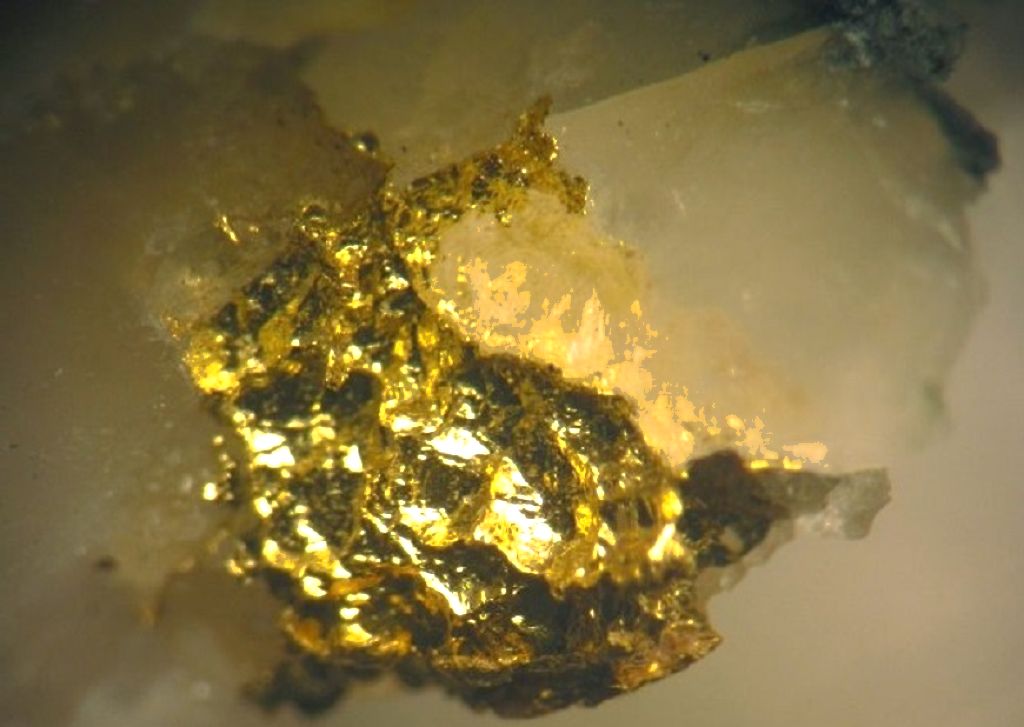
How much does a good metal detector cost?
Devices, whose price is 40000-60000 rubles, are considered professional, have a variety of manual settings, increased sensitivity.
Metal detector from 60000 rubles are devices equipped with the latest developments. Such equipment is capable of zoning even clay soil.
How to wash gold in the river in a simple way?
Then the carpet is removed and the settled sludge is poured into the washing tray. The tray is shaken repeatedly.
Is it possible to wash gold in an ordinary river, in the city of residence?
Prospector's Commentary

